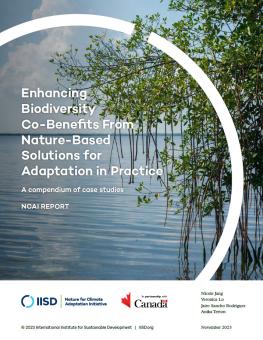
Enhancing Biodiversity Co-Benefits From Nature-Based Solutions for Adaptation in Practice
By sharing promising practices and lessons learned, these case studies seek to inform and inspire adaptation practitioners and planners to help ensure that biodiversity co-benefits are captured throughout the lifetime of a project.
-
Nature-based solutions for adaptation projects that protect biodiversity and ecosystems help sustain livelihoods and support community adaptation to climate change.
-
From mangrove restoration in Grenada to interurban biological corridors development in Costa Rica, nature-based solutions for adaptation projects help increase our resilience to climate change.
-
To ensure that nature-based solutions for adaptation interventions deliver biodiversity co-benefits, projects must be designed from the outset to provide measurable benefits for ecosystem health.
While nature-based solutions (NbS) for adaptation projects are increasingly being promoted and implemented, there is still little understanding of how such projects can achieve biodiversity co-benefits—multiple wins for both biodiversity and ecosystem functioning. Protecting and supporting biodiversity and ecosystems is important to delivering critical ecosystem services that help communities adapt to climate change and sustain their livelihoods, such as conserving wetlands to absorb floodwaters.
To address the gap in evidence, these two case studies have been developed as a supplement to the Nature for Climate Adaptation Initiative report Enhancing Biodiversity Co-Benefits From Nature-based Solutions on planning, designing, and implementing NbS for climate change adaptation that enhances biodiversity and ecosystem integrity.
The first case study describes how civil society organizations are protecting and restoring mangroves to strengthen coastal resilience to climate change in Grenada. The second case study examines the role of biological corridors in urban areas in Costa Rica to enhance biodiversity while contributing to the development of sustainable cities and a higher quality of life.
Each case study includes an overview of the local context and climate risks, how the project adapted to climate change and integrated biodiversity in practice, and lessons learned. The case studies were developed through interviews with project implementers and by reviewing relevant reports and documents.
This report is part of a compendium of resources developed by the IISD for the Nature for Climate Adaptation Initiative (NCAI), which is supported by Global Affairs Canada.
Participating experts
You might also be interested in
Mainstreaming Gender Equality and Social Inclusion in Nature-Based Solutions for Climate Change Adaptation
Discover tools, recommendations, and case studies on how to plan, design, and implement nature-based solutions for adaptation that advance gender equality and social inclusion while enhancing resilience, biodiversity, and ecosystem integrity.
Advancing Biodiversity-Positive Nature-Based Climate Solutions
From India to Ethiopia to Canada, exploring valuable examples of nature-based solutions’ potential while showcasing their versatility.
Enhancing Biodiversity Co-Benefits From Nature-Based Solutions
This technical report provides a set of recommendations to help plan, design, and implement nature-based solutions (NbS) for adaptation that enhance biodiversity and ecosystem integrity.
Thousands sign up to learn how to use nature in climate action
A new online course is available to help mobilize Ecosystem-based Adaptation from policy to implementation.
